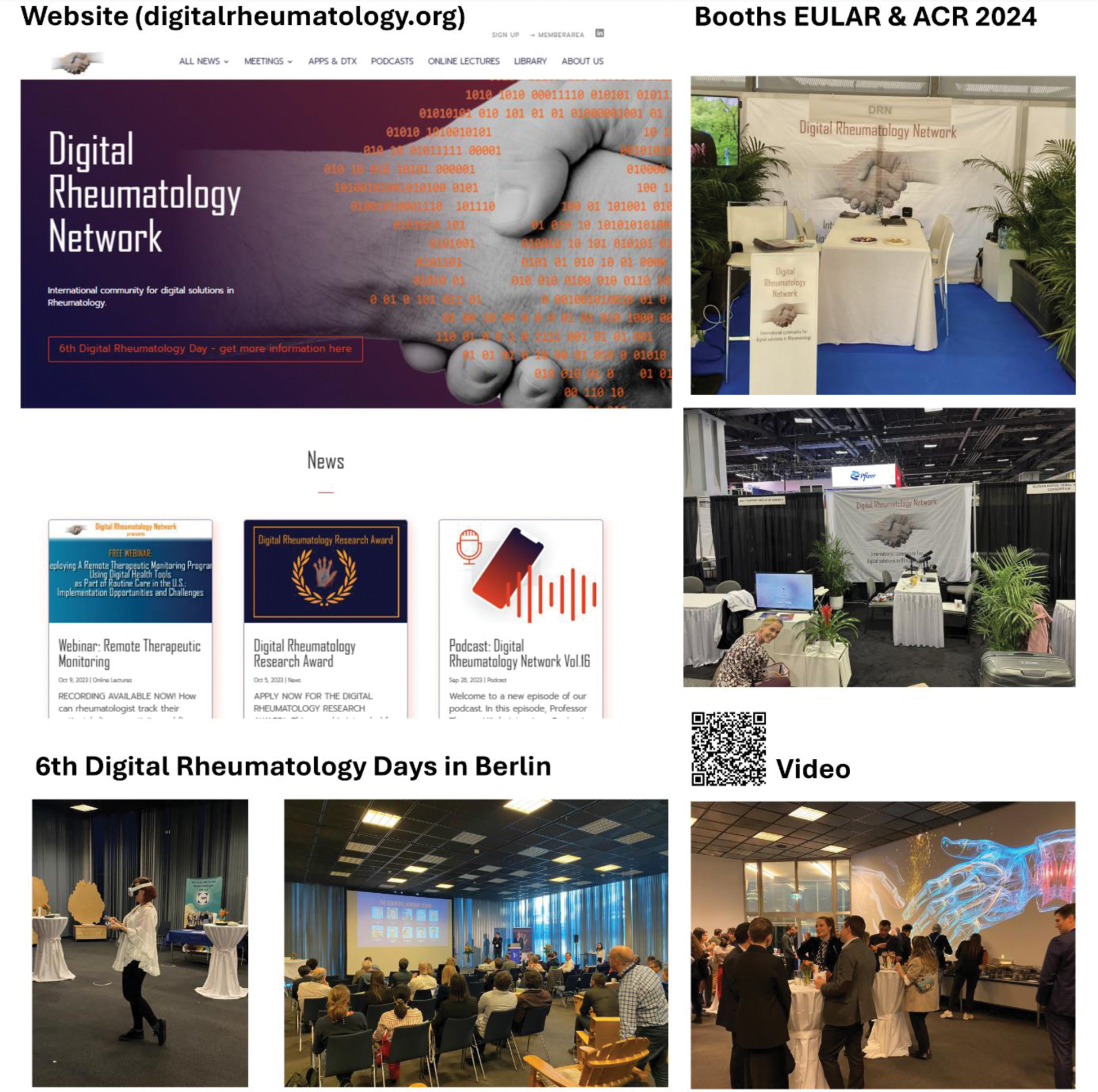

Background: The Digital Rheumatology Network (DRN,
Objectives: To outline the activities, trends, and achievements of DRN over the last five years while highlighting future directions in digital rheumatology.
Methods: This abstract reviews the evolution of conference content of the annual Digital Rheumatology Days, trends in the field, and additional DRN activities such as podcasts, webinars and research awards.
Results: The Digital Rheumatology Days began 2019 in Lausanne, Switzerland, transitioning to a virtual format in 2020 and a hybrid model in 2021. Since 2022, the conference has been held in Berlin as a fully or partially hybrid event (usually around 150 participants, Figure 1). Over 90 recorded lectures are accessible via the DRN website following free subscription. From 2019 to 2025, conference topics evolved from foundational digital health concepts like eHealth and patient self-monitoring to advanced themes such as disease-specific remote patient monitoring (RPM), digital biomarkers, digital therapeutics (DTx), AI for disease prediction, image recognition, and generative AI. Workshops, including sessions on App development, basic Python coding, machine learning, and digital pathways, have enriched the program. Initiatives like fishbowl discussions, roundtables, patient stories, and start-up pitches have fostered interactive engagement. The Digital Rheumatology Research Award, established in 2023, aims to recognize and promote outstanding research and development. An exponential increase in FDA-approved algorithms, especially for image recognition, has paralleled the COVID-19 pandemic’s influence, which accelerated the adoption of telemedicine and RPM. On the other hand, growth in DTx programs, such as Germany’s DIGAs has lagged behind expectations and video consultations saw a decline post-pandemic. The DRN has focused on community building to foster confidence in digital innovation, identifying trends and facilitate sustainable implementation of these innovations. Generative AI, spurred by tools like ChatGPT since 2022, has brought increased awareness and applications among all stakeholders. There is significant interest from specialized nurses in the DRN, as evidenced by the growing number of participants and speakers at the Digital Rheumatology Days. The DRN has also been active on social media, notably LinkedIn, where it engages over 1,000 followers from 31 countries, achieving over 14,000 impressions (Figure 2). Additionally, 25 DRN podcasts are available on its website and Spotify. Since 2024, DRN maintained a presence at major conferences like EULAR and ACR. DRD participants include rheumatologists, specialized nurses and other healthcare professionals, patients, pharmaceutical industry representatives, researchers and tech companies, fostering cross-disciplinary collaborations and publications on digital tools in rheumatology. The feedback grom the DRN activities has been very positive with a 4.8 rating for overall satisfaction, 4.5 for selection of topics and 4.9 for organization (each rated 0-5) for the last episode of the Digital Rheumatology Days in 2024. Current trends in digital rheumatology include the expansion and implementation of the digital portfolio, especially in the area of AI algorithms, remote patient monitoring and digital biomarkers in clinical practice. Key focus areas of the DRN include addressing clinical, organizational, and regulatory requirements to support the development and adoption of innovative technologies. These advancements aim to address pervasive workforce challenges, such as specialist shortages and burdensome administrative tasks, by enhancing efficiency through AI-powered solutions like voice recognition and automated reporting. Additionally, efforts should prioritize capacity building, improved accessibility to digital health, and the enhancement of treatment quality and clinical decision support systems. In order to achieve this, regulatory frameworks and the remuneration of digital applications must also be clarified. Furthermore, there is a need to advocate for the development of higher-quality software tailored to the digital needs of individual medical specialties, for example, through sidecar applications. The DRN will continue to provide an essential forum to showcase, collaborate and develop novel ideas and frameworks in digital rheumatology to improve future rheumatology care.
Conclusion: In just five years, DRN has emerged as a leading platform for digital literacy, innovation, and collaboration in rheumatology. By bridging disciplines and championing digital health, DRN has demonstrated its capacity to accompany and transform patient care and research. Looking ahead, DRN aims to expand its global presence, interdisciplinarity, enhance digital health education, and integrate AI and telemedicine into rheumatology practices, driving a technology-enabled, patient-centered future.
REFERENCES: [1]

Activities of the Digital Rheumatology Network.

Acknowledgements: NIL.
Disclosure of Interests: Thomas Hügle Abbvie, GSK, Lilly, Werfen, Novartis, Fresenius Kabi, Atreon, Vtuls, Novartis, Lilly, Fresenius Kabi, Latika Gupta: None declared, Antoni Chan: None declared, Bart van den Bemt: None declared, Vincenzo Venerito: None declared, Jutta Richter: None declared, Marc Blanchard Atreon, Jacob M. van Laar: None declared, Martin Krusche: None declared, Didier Hans Medimaps, Johannes Knitza: None declared.
© The Authors 2025. This abstract is an open access article published in Annals of Rheumatic Diseases under the CC BY-NC-ND license (